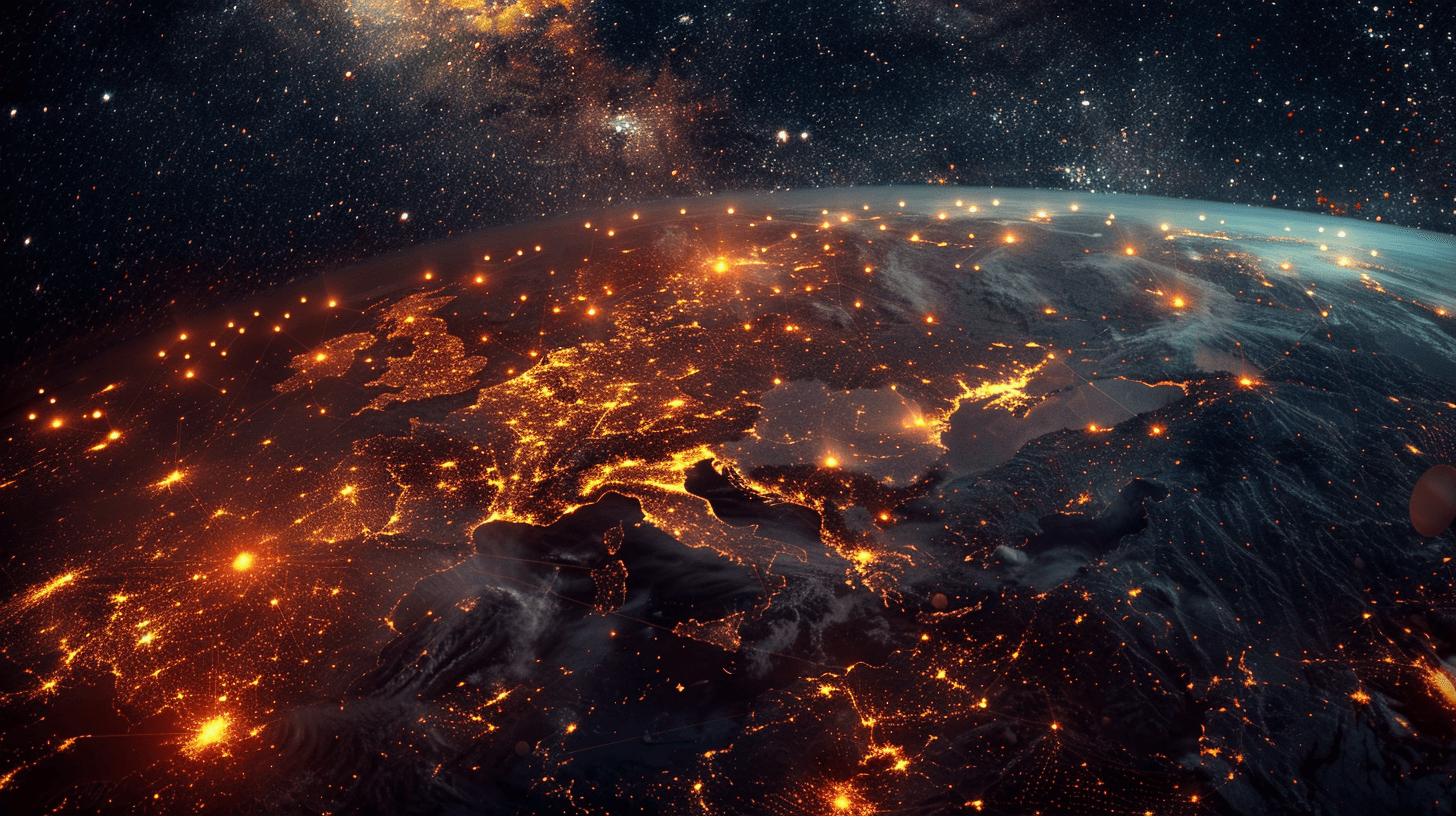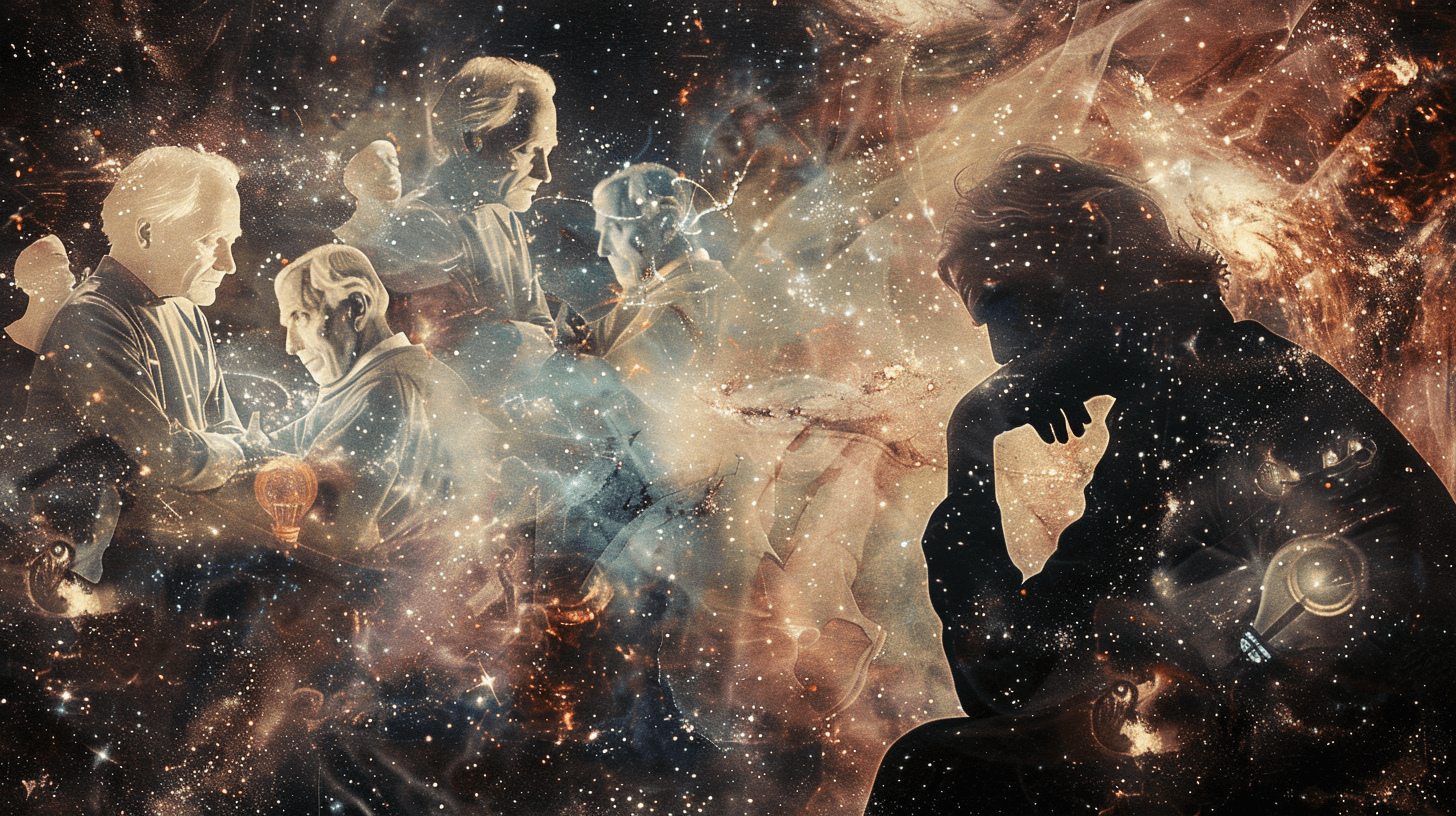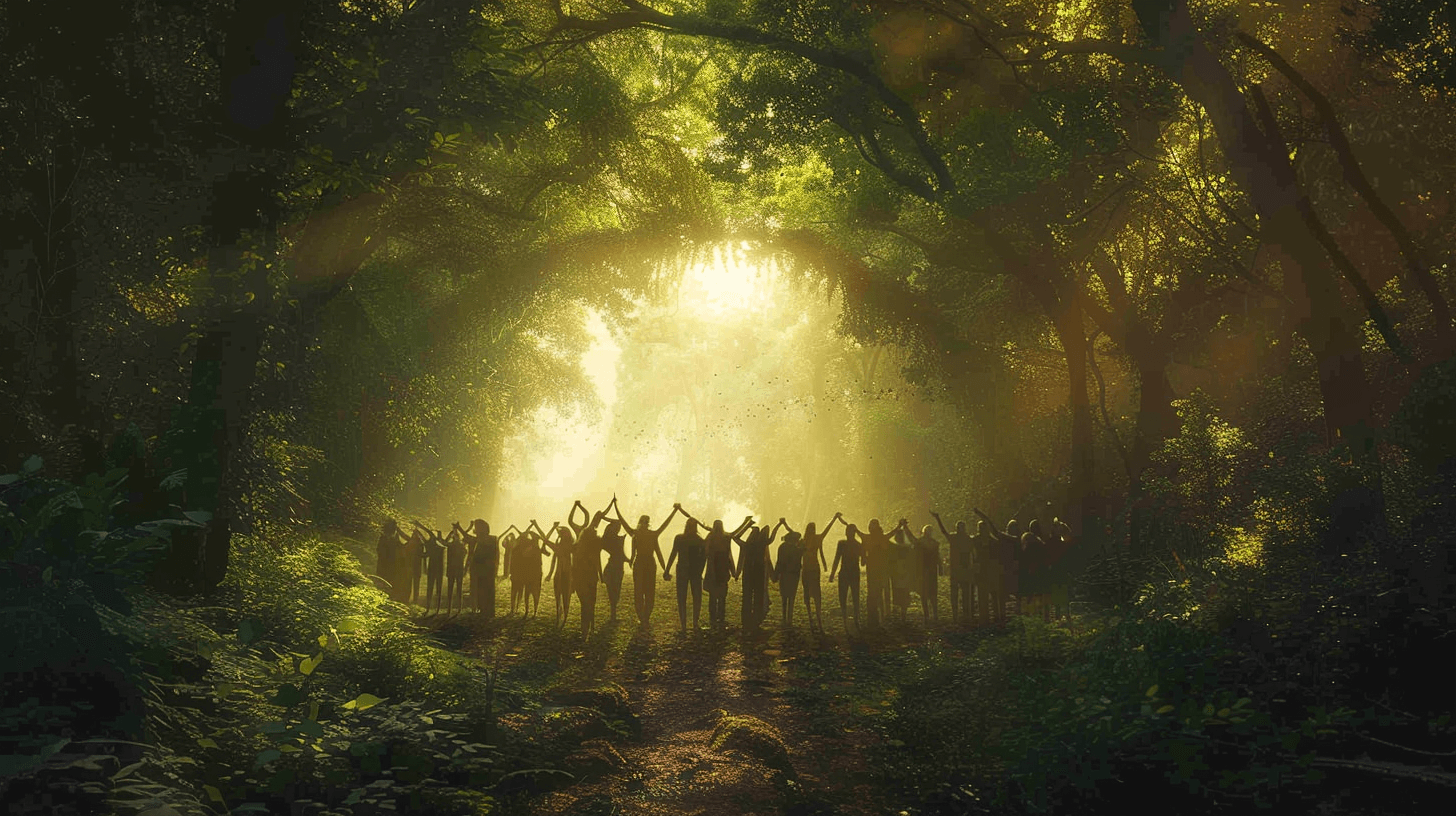Introduction: The Intersection of Individual Enlightenment and Collective Growth

Human enlightenment has often been framed as an individual pursuit—a journey inward, one of deep self-reflection, mindfulness, and personal transcendence. However, the true path to enlightenment transcends the individual and touches the collective. In today’s interconnected world, personal growth no longer exists in isolation. How we evolve, individually, impacts and shapes the broader consciousness of society. The pursuit of enlightenment is, therefore, not merely an internal quest but one that extends to collective transformation.
With this in mind, an important question arises: What role does the collective experience play in human enlightenment? This article seeks to answer that, exploring the interconnectedness between personal enlightenment and the collective consciousness through books that offer profound wisdom and practical insight. We will uncover how personal development contributes to collective growth, delve into essential readings that bridge the gap between self and society, and provide practical strategies for integrating individual enlightenment into global consciousness.
By the end, you’ll have a comprehensive understanding of how personal enlightenment and collective experience are intertwined, along with a carefully curated selection of books to aid you on this transformative journey.
Defining Human Enlightenment and the Collective Experience

Human enlightenment has been a subject of philosophical and spiritual inquiry for millennia, but its definitions vary across cultures. Eastern traditions such as Buddhism and Hinduism have long emphasized enlightenment as liberation from suffering and ignorance. Buddhism centers around the attainment of Nirvana—a state free from the cycle of birth and rebirth, marked by freedom from desire and attachment. Similarly, Hinduism envisions Moksha as the release from the cycle of reincarnation and unification with the divine.
In contrast, Western thought during the Enlightenment period focused on reason, intellectual development, and the pursuit of knowledge. Philosophers such as Immanuel Kant defined enlightenment as the courage to use one’s reason without guidance from another. While Western enlightenment was initially a personal and intellectual awakening, over time, it began influencing broader society through movements such as democracy and human rights.
However, across all these perspectives, one thing remains clear: personal enlightenment leads to a shift in perspective, one that often ripples outward to affect others.
The Collective Experience: What Does It Mean?
The collective experience of humanity has always been more than just a sum of its parts. From Jung’s collective unconscious to the mystical experiences described by ancient philosophers, the idea of interconnectedness pervades human thought. The collective experience refers to shared consciousness—the way individuals’ thoughts, actions, and spiritual growth contribute to a collective state of awareness.
In modern terms, collective experience also encompasses global movements like environmental sustainability, social justice, and digital connectivity, which illustrate the power of shared consciousness. Today, we’re witnessing a profound shift: personal growth, once considered a private endeavor, is increasingly recognized as a catalyst for collective human evolution.
How Individual Growth Influences the Collective
By embracing the interconnectedness of personal and collective enlightenment, we understand that individual actions, no matter how small, can alter the global narrative. This process can be compared to the “butterfly effect”—the idea that small actions can have far-reaching effects on complex systems. In the realm of spirituality, individual awakening can inspire others, contributing to larger societal transformations. As we evolve, so does the collective consciousness, pushing humanity toward greater harmony, peace, and sustainability.
Top Books on Human Enlightenment and the Collective Experience

In the following curated list, we present books that explore the synergy between individual enlightenment and collective growth. These texts go beyond the self and highlight the interconnected nature of human existence. Each book provides wisdom that bridges personal spiritual awakening with the larger, collective consciousness.
“A New Earth” by Eckhart Tolle
Themes: Collective awakening, transcending ego, global transformation.
Summary: Tolle’s masterpiece explores how overcoming the ego is key to both individual enlightenment and collective progress. He emphasizes the importance of awakening to a new state of consciousness that transcends materialism and egoic patterns, offering a vision for humanity’s future rooted in spiritual awakening.
Key Takeaways: The collective state of humanity is shaped by individual actions. Tolle’s work invites readers to shift away from the destructive patterns of the ego, creating a new, more peaceful, and connected world.
“The Global Brain” by Peter Russell
Themes: Humanity as a superorganism, interconnected consciousness.
Summary: Russell presents a revolutionary view of human society as a “global brain” in which humanity functions as a single organism. By aligning individual consciousness with collective needs, Russell argues that we can create a more harmonious and sustainable future.
Key Takeaways: Russell’s work challenges the assumption that individual enlightenment exists in a vacuum. Instead, he emphasizes the idea that our collective future depends on the enlightenment of each individual.
“Integral Spirituality” by Ken Wilber
Themes: Integration of personal and collective spiritual experiences.
Summary: Wilber’s integral theory integrates various schools of thought—spirituality, psychology, philosophy, and science—into a comprehensive framework. His work explores how individual spiritual practices contribute to collective human evolution.
Key Takeaways: Wilber provides a detailed roadmap for integrating personal enlightenment into broader collective structures, offering insights into how both contribute to human evolution.
“The More Beautiful World Our Hearts Know Is Possible” by Charles Eisenstein
Themes: Visionary optimism, spiritual activism, social change.
Summary: Eisenstein’s writing centers on the idea that individual transformation can lead to a collective awakening, paving the way for a more compassionate and just world.
Key Takeaways: Eisenstein offers hope that through personal enlightenment and spiritual activism, we can collectively create a world that aligns with our deepest values.
“The Art of Communicating” by Thich Nhat Hanh
Themes: Mindful communication, collective harmony, empathy.
Summary: Thich Nhat Hanh provides practical wisdom for using mindful communication to enhance relationships and contribute to collective peace. His teachings offer valuable lessons for both personal enlightenment and fostering collective unity.
Key Takeaways: By practicing mindful communication, individuals can foster empathy and harmony in their relationships, contributing to a more peaceful society.
Exploring the Synergy Between Personal and Collective Enlightenment

The concept of a feedback loop in spiritual growth is crucial to understanding how personal enlightenment affects collective consciousness. When individuals engage in practices such as meditation, self-reflection, and compassionate action, they not only experience personal transformation but also influence those around them. This ripple effect creates a positive feedback loop where enlightened individuals inspire others to seek their own growth, ultimately contributing to a more conscious society.
For example, Gandhi’s philosophy of non-violence not only transformed his personal journey but also mobilized an entire nation toward independence. The ripple effects of his actions inspired global movements for civil rights, showcasing the power of individual enlightenment in shaping collective futures.
The Role of Empathy and Compassion in the Collective Experience
At the core of the collective experience is empathy—the ability to understand and share the feelings of others. Empathy acts as the bridge between individual enlightenment and collective harmony. Philosophers like Martin Buber emphasized the importance of the “I-Thou” relationship, in which authentic human connection fosters mutual respect and shared consciousness.
As more people engage in spiritual practices that foster empathy and compassion—such as loving-kindness meditation—they help dismantle divisive mindsets, contributing to a collective shift toward understanding, tolerance, and unity.
Modern Movements in Collective Consciousness
Movements such as social justice, climate action, and global meditation initiatives exemplify how personal enlightenment leads to collective action. For example, meditation groups like The Heartfulness Movement or The Global Meditation Movement organize mass meditations aimed at raising global consciousness. These movements demonstrate how collective spiritual practices can lead to societal change, whether through environmental activism, global peacebuilding, or racial justice.
Practical Ways to Contribute to Collective Enlightenment

While the journey toward personal enlightenment often begins with introspection, its ripple effect on the collective consciousness can be profound. Every individual effort to cultivate awareness, compassion, and mindful action contributes to a larger wave of societal change. This section explores practical methods by which individuals can not only deepen their own spiritual journey but also impact the collective human experience.
Mindfulness and Meditation: Individual Practice, Global Peace
Mindfulness and meditation, while personal in nature, have far-reaching impacts on collective consciousness. Research has shown that meditation can reduce stress, improve mental clarity, and increase empathy—all qualities that foster social harmony. When practiced consistently, mindfulness can shift how individuals engage with others, cultivating a sense of presence, kindness, and patience in daily interactions.
In a broader sense, group meditation and mindfulness practices have been found to raise collective awareness. Global initiatives like The Heartfulness Movement and The Global Meditation Movement demonstrate the power of synchronized meditation sessions. When large groups come together to meditate, the shared intention for peace and harmony creates a ripple effect that influences not only the participants but also the surrounding communities.
Practical Application: Start with a simple daily mindfulness practice. Set aside 10-15 minutes for meditation, focusing on breath awareness or a mantra. As your practice deepens, consider joining local or online meditation groups that focus on collective consciousness-raising.
Conscious Communication: The Power of Words in Fostering Collective Harmony
Communication is one of the most immediate ways individuals interact with the collective. Words have power—the power to heal, to hurt, to inspire, or to divide. Thich Nhat Hanh’s teachings on mindful communication stress that the way we speak and listen can either contribute to collective harmony or perpetuate discord.
When we practice conscious communication, we engage in conversations with empathy, deep listening, and mindfulness. This type of interaction not only fosters personal growth but also creates more harmonious communities. Every dialogue becomes an opportunity to spread compassion and understanding, reinforcing the bonds of collective connection.
Practical Application: Begin by becoming aware of how you communicate. Focus on deep listening—giving full attention to the speaker without judgment or interruption. Speak thoughtfully, ensuring that your words are rooted in kindness and empathy. Over time, your mindful communication will influence others, creating an environment of respect and mutual understanding.
Service and Altruism: Acts of Kindness with Collective Impact
Service and altruism are core components of many spiritual traditions. Engaging in acts of service, whether through volunteer work, mentoring, or simple daily kindnesses, contributes to collective well-being. Small actions—helping a neighbor, volunteering at a shelter, or participating in community initiatives—have cumulative effects that extend far beyond the individual.
Studies on the ripple effect of kindness show that when one person performs a kind act, it often inspires others to do the same, creating a positive feedback loop in communities. Altruistic behaviors also foster a sense of interconnectedness, reminding individuals that their actions are part of a larger, collective fabric.
Practical Application: Look for opportunities to serve in your daily life. Whether it’s through formal volunteering or simply offering support to those around you, every act of kindness contributes to the well-being of the whole. Consider starting small, such as donating to a cause you care about or offering help to a friend in need.
Social and Environmental Activism: Enlightened Action for a Better World
One of the most powerful ways to contribute to collective enlightenment is through activism. Social justice movements, environmental sustainability efforts, and initiatives that promote equality and compassion are examples of how personal enlightenment leads to broader societal change.
Spiritual activism blends personal growth with social responsibility, recognizing that enlightenment is not a solitary journey but one that involves actively working toward the betterment of humanity. Figures like Mahatma Gandhi and Martin Luther King Jr. exemplify this idea, showing that personal spiritual conviction can fuel movements for widespread change.
In the environmental sphere, enlightened individuals are increasingly engaging in actions to protect the planet, recognizing that their well-being is intricately connected to the health of the Earth. By aligning personal values with activism—whether through advocating for climate justice, supporting renewable energy, or participating in local environmental cleanups—individuals contribute to the collective effort for planetary healing.
Practical Application: Choose an area of activism that resonates with you. Whether it’s social justice, environmental conservation, or human rights, find a way to engage meaningfully. Your activism, grounded in compassion and awareness, will inspire others and contribute to collective growth.
Philosophical and Spiritual Reflections on the Collective Human Experience

Philosophers and spiritual leaders throughout history have long pondered the nature of collective human consciousness and its relationship to individual enlightenment. Pierre Teilhard de Chardin, a French Jesuit priest and paleontologist, proposed the concept of the Omega Point—the idea that humanity is evolving toward a point of unified consciousness. According to Teilhard, as individuals awaken to their spiritual potential, they collectively advance toward a state of unity with the divine.
Carl Jung introduced the notion of the collective unconscious, a shared repository of human experiences, archetypes, and wisdom. Jung argued that individual psychological development contributes to the collective evolution of humanity’s unconscious, fostering deeper understanding and connection across cultures and societies.
Philosophical traditions like existentialism and humanism also provide valuable reflections on the importance of individual freedom and responsibility in shaping collective human destiny. While existentialists such as Jean-Paul Sartre emphasized personal responsibility in a seemingly indifferent universe, they also acknowledged the interconnectedness of individual choices in shaping society.
Practical Insight: These philosophical frameworks suggest that personal enlightenment is not merely a solitary pursuit but one that resonates within the collective. Each individual’s journey contributes to the broader human experience, shaping the future of humanity.
Eastern Spirituality and Collective Growth
In Eastern traditions, the idea of oneness with the universe is deeply embedded in spiritual practice. Buddhism’s Bodhisattva path offers a powerful example of the union between personal and collective enlightenment. Bodhisattvas, individuals who attain enlightenment but choose to remain in the world to help others, embody the principle that personal awakening should serve collective growth.
Similarly, Hinduism’s concept of Dharma—the righteous path—emphasizes that individual actions are interconnected with cosmic law and social order. The fulfillment of one’s personal duty, in alignment with spiritual values, contributes to the greater harmony of the universe.
Practical Insight: Eastern spiritual practices, such as yoga and meditation, focus on aligning the individual with universal consciousness. These practices remind us that personal enlightenment is incomplete without contributing to the collective upliftment of humanity.
The Future of Human Enlightenment: Where Are We Headed as a Collective?

We are witnessing a shift toward global interconnectedness, driven by advancements in technology, social movements, and the increasing importance of mental and emotional well-being. The Great Awakening, a term often used to describe a global spiritual shift, has manifested through movements advocating for mindfulness, empathy-driven leadership, and social responsibility.
The rise of digital connectivity has allowed for the rapid dissemination of spiritual practices and global meditations, such as the Global Synchronized Meditations, which aim to raise collective consciousness. Social movements focused on equality, environmental sustainability, and justice reflect the growing awareness that individual actions must align with the broader human good.
The Role of Technology in Collective Growth
Technology has played a paradoxical role in collective growth. On one hand, it has the potential to deepen divisions and isolation through excessive screen time and disconnection from physical reality. On the other hand, technology has also been instrumental in fostering global unity. Platforms like social media and virtual communities allow individuals from different backgrounds to connect, share wisdom, and engage in collective spiritual practices.
Technological advancements such as AI, virtual reality, and biofeedback are now being integrated into spiritual practices, offering new ways for individuals to engage with mindfulness and meditation. Apps that facilitate group meditation sessions and virtual reality environments designed for introspective practices are changing how we experience collective spiritual growth.
The Path Ahead: How Individual Action Shapes the Collective Future
The future of human enlightenment hinges on the decisions individuals make today. As more people engage in personal spiritual practices—whether through meditation, conscious activism, or simply practicing kindness—the collective human experience will evolve. Global movements toward sustainability, mental health awareness, and empathy-driven governance show that humanity is on a trajectory toward greater alignment with universal consciousness.
However, this future is not guaranteed. It requires a commitment from each individual to contribute positively to the collective experience. Activism rooted in compassion, ethical leadership, and mindful living will play key roles in shaping the next phase of human enlightenment.
Conclusion: Embracing the Journey of Collective Enlightenment

The journey toward human enlightenment is not a solitary one. As we have explored throughout this article, individual growth is deeply intertwined with collective consciousness. Each personal awakening sends ripples through society, fostering greater empathy, compassion, and awareness.
By engaging in practices such as mindfulness, conscious communication, service, and activism, individuals can contribute to the collective experience in meaningful ways. The books and philosophies discussed in this article offer pathways for both personal and collective growth, serving as guides for those who wish to align their spiritual journey with the greater good.
As we move forward, let us remember that the future of human enlightenment depends on each of us. By embracing our role in the collective experience and committing to living with purpose, empathy, and awareness, we can contribute to a brighter, more enlightened future for all of humanity.
Start with yourself, but never forget the power of the collective. Together, we shape the future.








